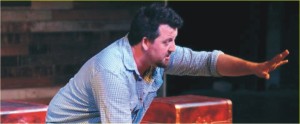Queensbury Theatre (formerly The Country Playhouse)
If You Go To This Run of “Cocaine & Ethel Merman: The New Homo Guide” and You Write A Convincing Article For The Houston Critic About How You Really Didn’t Enjoy The Play, I’ll See What I Can Do About Repaying You For Your Ticket.
July 6, 2014– I’m not rich. I’m a humble teacher, but I just can’t see there being any possibility that you can find fault with this show that would keep you from liking it. This play seems so personal that I’d feel like a sucker if I found out Robert Westeen was just “acting”. I extend my offer to the members of the audience who take my recommendation and go to this show, that I will repay them for their tickets if they can write me a convincing article telling me why they didn’t like the play I recommended that they see. It’s of local origin. Robert weaves in and out of characters like the pro he is. He packs a lot of ‘his’ life into this one hour, one act play. He made me sad to remember how many friends and colleagues I’ve lost to AIDS. His guide wasn’t really a homo guide or even a guide; just a final statement about living life to the fullest, no matter what gets thrown at you. I really almost NEVER give standing ovations. I was standing for this one.
Group or ‘GROUP’?
June 26, 2014 — Queensbury Theatre, formerly famously The Country Playhouse’s, “Oleanna” performance tonight demonstrates the highest level of live theatre spirit. This two-actor play lost one of its actors two weeks ago and in the best “the show must go on” spirit, Keshia Lovewell took over the part and played it tonight: all those lines only two weeks later! All that sub-text and sub-sub text addressed in only two weeks? Who cares if this is community theater? As a matter of fact, that makes it even more impressive, that she is doing it for the community and so that the show would not be cancelled. Wow! What inspiration! For that reason alone, I wish them full houses every night they perform this show.
I was pulled in and listening and engaged for the whole two hours that Joseph Lockett and Keshia Lovewell were on stage. The time flew.
What I saw, amazed as I am that they were able to put up the show at all under the circumstances, was, in Act One, the professor drumming out the beats suggested by Mamet’s style of sub-textual, even non-textual, writing. I was surprised when he said he was obviously having problems with his wife. What he had said on the phone, the way he said it, was not so obviously the sounds of a ‘problem with the wife’ to me. I also wonder about his choice to give subtlety to his physicalizations of power and self absorption. If I had ‘felt’ like he was showing her he was capable of exerting power over her physically, by his presence and demeanor, not just that he was self absorbed and distracted by the telephone, I might have questioned more, the possible veracity of her complaint to the tenure committee in Act Two. Does he deserve to have his life and livelihood destroyed because he is distracted during his meeting with a female student? If, during the second act, I’m just saying he definitely didn’t do those things, specifically those sexually aggressive things, about which she has complained to the school, maybe I’m not as interested. If I’m questioning whether or not it was the ‘smell’ of power lorded over her and ‘I could use my power if I wished’ that she was complaining about, I’d be carried along the spine of the play more easily. Act Two, would then allow me to question all of his actions as symbolic of the physical ‘smell’ of his manifestation of unfitness as a professor.
When I asked Keshia , tribute to live theater performance that she is, some of the reasons for how she played her character, I couldn’t reconcile what she told me with what I thought the script indicated. She played Act One like a child, drawn into herself, unseeing of the world unless she could resee it in her written notes. I find it hard to justify what she becomes, so soon in time, for Act Two. Could an argument be made that the professor had found a way to teach her self reliant thinking and strength of character so quickly with just one meeting? Ms. Lovewell claims that she interprets the play as having her finding ‘The Group’ with whom she devises the means to destroy the professor, merely, as a reaction and subsequent to her having that one distracted meeting with her professor who gave her a bad grade on a paper. It puts a whole different twist on the play if she, as she says in the third act, has been studying his actions and weaknesses for, at least, two semesters, that the Group is one DESIGNED to destroy old-fashioned-thinking male professors, that she is a spy or operative to get the professor to stop ALMOST showing his dark side, by the way he treats his wife, by physicalizing sexualized power, by his own stupid statements, and to PROVE that he is undeserving of the privilege of teaching students. I asked Keshia if “Carol” ever had power over the professor. Ms. Lovewell told me that she interpreted the role as NEVER having any power, more as a child lashing out in anger without foresight and planning. That would make understandable why Keshia as Carol contorted her face with angry expressions for so much of the second and third acts, why she ‘closes in’ on the professor when she tries to tell him things she wants him to know, when she tries to exert influence. If she was the mastermind of his demise, would she play the angry growing up person or rather the NEW professor of truth, powerful enough to lean back in her own seat with her hands behind her head? I just can’t seem to see the play as being as interesting if it’s just the process by which old male professors, who haven’t written books that “Groups” like, get replaced and that they can get angry for being accused of the ‘smell’ of corruption, found out by the letter of the law in a student’s notes.
Support real live theater!!!!


